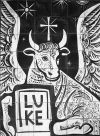
The Gospel of Luke
Your Faith has Saved You: Lk 17,11-19
The story of Namaan sets the scene because his expectations would have been those of magic, he thought that he could buy his way into God's favour. He had to learn that the relationship is the other way round, his total dependence can only be on God and the ways of God. After his successful cleansing, he is ready to worship God and God alone. Only then does Elisha go to meet him (2 Kings 15-19).
Leprosy meant isolation from one's community; salvation means restoration to the community. That is the theme of this incident. As we discovered wirh the leper in chapter 5, the book of Leviticus goes into considerable detail about various skin diseases and how they should be judged. In chapter 5, Jesus touched the leper. Here in a more traditional way, the ten keep their distance, verse 12.
In the previous verse, verse 11, the geography is rather confused. The purpose is a reminder that the journey to Jerusalem continues. The closeness to Samaria prepares us for what follows.
In verse 13, some translations speak of "have mercy", others "have pity". Then in verse 19, some speak of "save" others "made you well" (NRSV) or similar. I prefer "mercy" and "save" because these words have a clear biblical meaning. It is certainly strange that the NRSV has "made you well" in verse 19 when the Greek is so clearly "has saved".
This is another Luke two part story, as with the prodigal son in chapter 15 or the rich man in chapter 16. The stress therefore is on the second part, the healing of the Samaritan and his response.
The Samaritan in verses 15 and 16 glorifies God. He fell at the feet of Jesus (as NABRE; "prostrate" (NRSV) has overtones of worship which are not appropriate here) and thanked him.
Unlike the other nine, the Samaritan would not have been welcomed by the priests in Jerusalem. Hence his dilemma, which priest to show himself to. His answer though was to return to Jesus recognising God's presence in him.
Verse 19 reads literally: "Rise and go your way. Your faith has saved you." As with the mother in law in 4,39, translations miss the point with "get up".
"Your faith has saved you" is used three times in the Gospel, again with inconsistency among the translations: the woman in 8,48 and the blind man in 18,42 being the others. Only here is the phrase linked with the resurrection, an important connection,unique to Luke.
Thus the NRSV "Get up and go on your way; your faith has made you well" misses the whole point of this conclusion.
As a result, there is a connection between this leper's faith and the apostles request for faith in the previous scene, 17,5.
Let us return to the main page.
The Sunday Gospel
The story of the healing of Naaman in 2 Kings 5 is though the background to the healing of the Samaritan. These verses of the Gospel begin with Naaman bathing in the Jordan and being washed clean. The echo of baptism in clear in Christian tradion. Thus Naaman's progress to this point can be seen as parallel to the progress of the convert as he or she prepares to be baptised.
On this Sunday, the key word is "salvation", the salvation which is in Christ Jesus (2 Tim 2,10). The responsorial psalm is also sung at Mass on Christmas Day.
Let us return to the main page.
